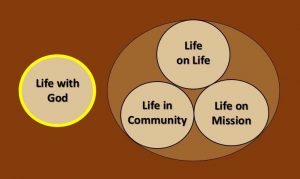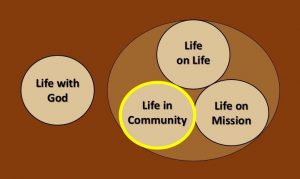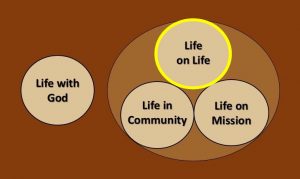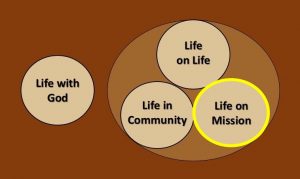While Ken was out of town, I delivered this message on October 13, 2019.
BIBLICAL DISCIPLEMAKING – The Pathway (2 Timothy 2:2)
HOW TO GROW A CHURCH:
I have an observation. Seminary has taught a whole lot of pastors how to plant and grow a church. Let’s look at the typical method used.
- Start out with a small group to cast a vision for what could be.
- Canvas the community with invitations and advertising.
- When the original location gets full, find a larger meeting place, an auditorium to rent.
- Attract more people with a worship experience, but still have small groups to make relational connections.
- When financially able, build something to have worship on our own property.
- Still have small groups, but these groups are now a little too clique-ish and crowded, and besides, we don’t have space to start new classes.
- We continue to emphasize our gateway ministry (the worship experience) to get people saved and then mature in their faith, and now people don’t sense the need for the community we find in a small group.
- I come for what I want on Sunday morning and don’t need connection with others.
- I like the anonymity of the crowd, just showing up at worship without the messy-ness of relationships, I can keep my spirituality private.
- I even arrive just on time and leave during the last song to avoid getting involved.
OH, MY GOODNESS, LOOK HOW FAR WE HAVE FALLEN
This method allows us to look back at what we have built and wonder if Jesus is pleased with the way the American church doing church. In the beginning, there was passion and fervor for reaching people with the gospel and inviting them to church, but has our culture turned church into something more like this?
- The community knows where we are, they can find us and visit if they want to.
- My church is full of friends, I don’t have time for more relationships.
- We are a friendly church, but when they don’t come back, is it because they are looking for a friendly church or are they looking for friends in church?
- If people want to come to my church, they need to be more like us to fit in. Look like us, dress like us, listen to music like us, have their lives all together like us.
IS THIS WHAT JESUS HAS CALLED US TO DO?
The only imperative command in the Great Commission tells us to make disciples. The word GO is a participle, like “as you are going…” So, my question is this: How are we doing at making disciples? Are we making disciples or just making converts? Are people on a lifelong journey of becoming more and more like Jesus or just involved in the programs we have at the church building? If that is the case, how are we different from the YMCA? Maybe we need to understand what a disciple really is…
THE DEFINITION OF A DISCIPLE:
The place to start with discipleship is having a CLEAR definition of a disciple. A “disciple” is a FOLLOWER of Jesus (meaning a learner, student, apprentice, intern) who IS DEVELOPING the…
- Convictions of Jesus (HEAD)
- Character of Jesus (HEART)
- Competencies of Jesus (HANDS)
- Compassion of Jesus (HEELS)
…at the same time, LEADING OTHERS to do the same. 1
So, with Jesus as our example, we need to identify the CHARACTER qualities Jesus possessed, and begin working on them in our lives in the context of Christian community, and then do the same with Christ’s CONVICTIONS, COMPETENCIES, and COMPASSION.
Without getting into too many details, what does a disciple of Jesus look like? How about this picture?
THE GOAL OF DISCIPLEMAKING?
I submit to you that a disciple LOOKS LIKE JESUS.
- Romans 8:29 says, “For those whom He foreknew, He also predestined to BECOME CONFORMED TO THE IMAGE OF HIS SON, so that He would be the firstborn among many brethren.”
- Paul tells us in 1 Corinthians 11:1 – “Be IMITATOR OF me, just as I also am of CHRIST.“
- A third verse worth sharing here is Galatians 4:19 – My children, with whom I am again in labor UNTIL CHRIST IS FORMED IN YOU.
Paul lived this… in Acts 14:21, Regarding Paul and Barnabas, “After they had preached the gospel to that city and had MADE MANY DISCIPLES,”
Whatever Paul MADE, he accomplished it before he appointed some of them as leaders. The text says that after Paul’s team returned to Lystra, Iconium, and Antioch, he “appointed elders for them in every church” (Acts 14:23). Looks like Paul had a PLAN and a PATHWAY.
This may be a “duh” moment, but before you make something, you need to define your END PRODUCT. Years ago, Stephen Covey said, “Begin with the end in mind.” We are NOT going to make a disciple of Christ if we are not INTENTIONAL about discipleship and don’t have clear GOALS for spiritual formation.
So, the church model that I described at the beginning of this message… does that look like the method Jesus used to grow disciples and to build HIS church?
THE JESUS METHOD:
Did Jesus make disciples by attracting a large group of people? Think about the Sermon on the Mount and the Feeding of the 5000. He didn’t ignore the crowd, but he also didn’t use the crowd to make disciples or to build his church. So, this observation begs the question… why do we do it THIS WAY now?
Let’s look at the more biblical method for making disciples… I think THE JESUS METHOD looks more like a MAP than a MENU.
- Church is often like ordering off the MENU – I’ll take a little worship a couple times a month, a Wednesday meal or two, maybe snack on prayer once a week (when I am in trouble) but hold the Sunday School class and the Life Group. If I like what I experience, I’ll leave a good tip and return for another Sunday. THIS is very consumer oriented; it’s all about me and what I want at church.
- But if church is more like a MAP – there is a discipleship pathway that we need to follow in order to make it to our destination. When I say destination, I’ll not talking about heaven at the end of this life.
Remember – we are NOT just saved FROM something (sin, death, hell, and the grave) we are saved FOR something. The disciple’s life is so much more than showing up at church a couple times a month. Unless we pull out the MAP and experience the JOURNEY set before us, we will miss all that Jesus has in store for us.
Let’s quickly look at the Jesus method for disciplemaking…
Out of the large CROWD of people, Jesus turned to a smaller group of followers… as an example, look at the 70 (or 72 in some translations, in Luke 10:1-16) and also the 120 in the Upper Room (Acts 1:15). These are the people who embraced the message of Jesus and attended a larger gathering, let’s call this level the CONGREGATION.
This really is the FIRST vital relationship we have, LIFE WITH GOD; it is a relationship with God where we become a MEMBER of God’s forever family, which is an issue of salvation. But it is also an issue of fellowship since people are invited into the local community of King’s Grant Baptist Church.
After seeing the larger group of followers (the Congregation) Jesus prayed one night and chose the Twelve to be with him, and then send them out to preach and have authority over demons (Mark 3:13-19). These are the men with whom he spent most of his time, investing not only in THEIR future but in the future of Christianity and the gospel message of salvation. This smaller group of people I will call the level of COMMUNITY.
 If the first vital relationship is LIFE WITH GOD, the second vital relationship is LIFE IN COMMUNITY.
If the first vital relationship is LIFE WITH GOD, the second vital relationship is LIFE IN COMMUNITY.
Since King’s Grant is a Community of Faith, and not a Congregation of Faith, involvement in a small group is EXPECTED. But this part of American Christianity is often neglected, because people prefer the anonymity of the congregation. To get involved in the community means I will have to take a risk and allow people to get to know my name and something about me, the good and the bad.
I see THIS is where we are at King’s Grant. We have a congregation that meets in here and we also have a community that meets in small groups. Since I’m talking about using a MAP to follow a Pathway of Discipleship, THIS is not our destination, the place where we want to end up.
We have built a big church, but have we made disciples? Are we full of disciples who have conformed to the image of Christ, who are pressing on toward maturity measured by the stature of Jesus, and are these Jesus followers also making disciples?
DREAM WITH ME:
What would it look like to get people from within the COMMUNITY (Life Groups and Sunday School classes) into what I have heard called microgroups of 3-4 people, for the intentional purpose of becoming disciples who make disciples, who make disciples?
 I would call this the level of the CORE. This is where lives intersect and where people share life together. This is the third vital relationship, a relationship I call LIFE ON LIFE.
I would call this the level of the CORE. This is where lives intersect and where people share life together. This is the third vital relationship, a relationship I call LIFE ON LIFE.
Even in our large classes here at King’s Grant, people can still be anonymous and travel in and out through our doors without making any real connections. The idea here is that those at the CORE level will experience life together and encourage one another through the hard times of trials and temptations, as well as share the good times of growth, celebration, and victory. People in these microgroups also would hold each other accountable for conforming to the image of Christ (which is a topic for another day).
 Finally, this Pathway leads us full circle back to the CROWD because this fourth vital relationship is what we have termed, LIFE ON MISSION. At this stage we are involved in serving others and giving back to our community because it is part of our life mission and our character. We live life ON MISSION, which in our 3M vision at King’s Grant, this is living at M3 level.
Finally, this Pathway leads us full circle back to the CROWD because this fourth vital relationship is what we have termed, LIFE ON MISSION. At this stage we are involved in serving others and giving back to our community because it is part of our life mission and our character. We live life ON MISSION, which in our 3M vision at King’s Grant, this is living at M3 level.
Regarding the pathway, we don’t have to walk through these first three vital relationships to be on mission with God, but how effective will we actually be while serving God and others with an empty tank? How much more effective and useful to the Kingdom will we be when we are serving God and others out of the overflow of our relationships with others in our community of faith?
LET’S DO A LITTLE SELF-ASSESSMENT:
Perhaps you have listened to all of this and have discovered where you are on the MAP. Hopefully you are not satisfied with where you are in your walk with Jesus, because he is perfect, and we are far from it. The purpose of a Pathway is so that all of us at King’s Grant will know the next steps we need to take in becoming a disciple of Jesus and disciplemaker of others.
Over the next several months I will be working with my Discipleship Leadership Team on how we can develop a clear Pathway of Discipleship, using the model that Jesus left with us. Time will be spent in prayer over who to invite along this journey but perhaps God has already spoken to you TODAY about taking a next step in your walk with Christ.
I pray that NO ONE in this room feels that they have arrived, gone as far as they need to with Jesus, or believe something like, “me and Jesus are just fine.” The Disciple’s Pathway takes us on a lifelong journey. Ask yourself, “Is it time to get out of the Rest Area?”
1 – Definition of a Disciple and the Four Vital Relationships
are from my classes with Rick Leineweber.





